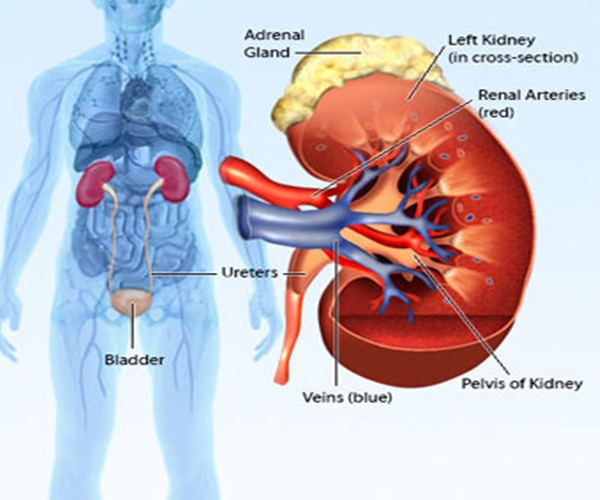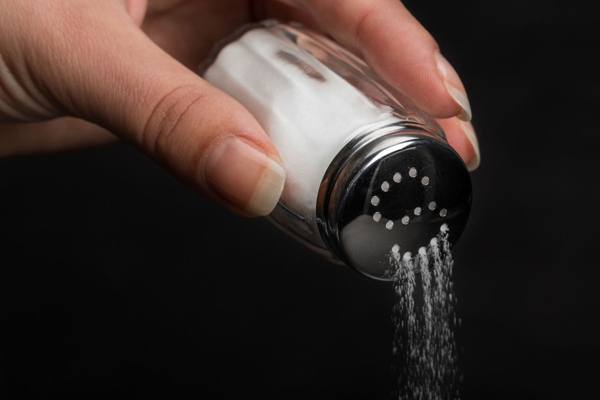
The kidneys are two bean-shaped organs, located against the back muscles in the upper abdominal cavity just below the rib cage, one on each side of the spine. The kidneys detoxify the blood and aid the body in filtering out waste products through urine.
Another primary function of the kidneys is to remove excess water from the body. They also help retain water when the body needs more.
Moreover, the kidneys help regulate the levels of minerals like calcium and phosphate in the body. They also produce important hormones that help regulate body functions like blood pressure and making of red blood cells to carry oxygen and important nutrients throughout the body.
To stay healthy, it is essential to keep the kidneys functioning properly. Some common symptoms that can indicate kidney problems are a change in color and quantity of your urine, dizziness, vomiting, anemia, breathing issues, feeling cold most of the time, tiredness or fatigue, itchy skin, bad breath and sudden pain in the body. If you experience any of these symptoms, consult your doctor to rule out the possibility of kidney disease.
There are many reasons behind kidney problems. However, many habits that people adopt can also cause huge damage to their kidneys.
1. Overusing Painkillers
Over the counter pain medicines, such as NSAIDs (nonsteroidal anti-inflammatory drugs), may alleviate your aches and pains, but they can harm the kidneys, especially if you already have kidney disease. Reduce your regular use of NSAIDs and never go over the recommended dosage.

2. Abusing the Salt Shaker
Diets high in salt are high in sodium, which can increase blood pressure and, in turn, harm your kidneys. Flavor your foods with herbs and spices instead of salt. Over time, you may find it easier to avoid using added salt (sodium) on your food.

3. Eating Processed Foods
Processed foods are significant sources of sodium and phosphorus. Many people who have kidney disease need to limit phosphorus in their diets. Some studies have shown that high phosphorus intake from processed foods in people without kidney disease may be harmful to their kidneys and bones. Try adopting the DASH diet to guide your healthy eating habits.

4. Not Drinking Enough Water
Staying well hydrated helps your kidneys clear sodium and toxins from the body. Drinking plenty of water is also one of the best ways to avoid painful kidney stones. Those with kidney problems or kidney failure may need to restrict their fluid intake, but for most people, drinking 1.5 to 2 liters (3 to 4 pints) of water per day is a healthy target.

5. Missing Out on Sleep
A good night’s rest is extremely important to your overall well-being and, it turns out, your kidneys. Kidney function is regulated by the sleep-wake cycle which helps coordinate the kidneys’ workload over 24 hours. Research shows that people who sleep less usually have faster kidney function decline.

6. Eating Too Much Meat
Animal protein generates high amounts of acid in the blood that can be harmful to the kidneys and cause acidosis – a condition in which kidneys cannot eliminate acid fast enough. Protein is needed for growth, upkeep and repair of all parts of the body but your diet should be well balanced with fruits and vegetables.

7. Eating Too Many Foods High in Sugar
Sugar contributes to obesity which increases your risk of developing high blood pressure and diabetes, two of the leading causes of kidney disease. In addition to desserts, sugar is often added to foods and drinks that you may not consider “sweet.” Avoid condiments, breakfast cereals, and white bread which are all sneaky sources of processed sugar. Pay attention to the ingredients when buying packaged goods to avoid added sugar in your diet.

8. Lighting Up
Sure, smoking isn't good for your lungs or your heart. But did you know that smoking may not be good for your kidneys either? People who smoke are more likely to have protein in the urine – a sign of kidney damage.

9. Drinking Alcohol in Excess
Regular heavy drinking – more than four drinks a day – has been found to double the risk chronic kidney disease. Heavy drinkers who also smoke have an even higher risk of kidney problems. Smokers who are heavy drinkers have about five times the chance of developing chronic kidney disease than people who don’t smoke or drink alcohol to excess.

10. Sitting Still
Sitting for long periods of time has now been linked to the development of kidney disease. Although researchers don’t know yet why or how sedentary time or physical activity directly impact kidney health, it is known that greater physical activity is associated with improved blood pressure and glucose metabolism, both important factors in kidney health.

